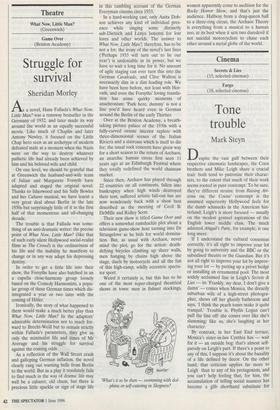Theatre
What Now, Little Man? (Greenwich) Game Over (Brixton Academy)
Struggle for survival
Sheridan Morley
Aa novel, Hans Fallada's What Now, Little Man? was a runaway bestseller in the Germany of 1932, and later made its way around the world as an equally successful movie. Like much of Chaplin and later Antony Newley, it focused on the Little Chap hero seen as an archetype of modern defeated male at a moment when the Nazis were on the way to destroy whatever pathetic life had already been achieved by him and his beloved wife and child.
On one level, we should be grateful that at Greenwich the husband-and-wife team of Julian and Margarete Forsyth have adapted and staged the original novel. Thanks to Isherwood and his Sally Bowles and her Cabaret musical, we have learnt a very great deal about Berlin in the late 1930s but surprisingly little of it in the first half of that momentous and all-changing decade.
The trouble is that Fallada was some- thing of an anti-dramatic writer: the precise point of What Now, Little Man? (like that of such early silent Hollywood social-realist films as The Crowd) is the ordinariness of his life and the inability he manifests to change or in any way adapt his depressing destiny.
In order to get a little life into their show, the Forsyths have also batched in an a capella close-harmony group loosely based on the Comedy Harmonists, a popu- lar group of these German times which dis- integrated a year or two later with the coming of Hitler.
Ironically, the story of what happened to them would make a much better play than What Now, Little Man? In the adaptors' admirable determination not to reach for- ward to Brecht-Weill but to remain strictly within Fallada's parameters, they give us only the minimalist life and times of Mr Average and his struggle for survival against the coming odds.
As a reflection of the Wall Street crash and galloping German inflation, the novel clearly rang out warning bells from Berlin to the world. But as a play it resolutely fails to find much in the way of drama: life may well be a cabaret, old chum, but there is precious little sparkle or sign of stage life in this rambling account of the German Everyman cinema circa 1933.
In a hard-working cast, only Anita Dob- son achieves any kind of individual pres- ence while singing some distinctly sub-Dietrich and Lenya laments for lost loves and other worlds. The answer to What Now, Little Man?, therefore, has to be not a lot; the irony of the novel's last lines (Perhaps 1933 will turn out to be our year') is undeniable in its power, but we have to wait a long time for it. No amount of agile staging can ever turn this into the German Cavalcade, and Clive Walton is necessarily dim in a dim leading role. We have been here before, not least with Hor- vath, and even the Forsyths' loving transla- tion has some quirky moments of anachronism: 'Park here, dummy' is not a line you'd have heard even in German around the Berlin of the early Thirties.
Over at the Brixton Academy, a breath- taking picture palace of the 1930s with a fully-carved ornate interior replete with three-dimensional scenes of the Italian Riviera and a staircase which is itself to die for, the usual rock concerts have given way for a short season to the return of Archaos, an anarchic human circus first seen 11 years ago at an Edinburgh Festival where they totally redefined the world chainsaw market.
Since then, Archaos has played through 22 countries on all continents, fallen into bankruptcy when high winds destroyed their tent, suffered artistic fall-out but are now wondrously back with a show best described as the meeting of Cecil B. DeMille and Ridley Scott.
Their new show is titled Game Over and offers a somewhat ramshackle plot about a television game-show host turning into Dr Strangelove as he bids for world domina- tion. But, as usual with Archaos, never mind the plot, go for the action: death- defying bicycles climbing up sheer walls, men hanging by chains high above the stage, duels by motorcycle and all the fun of this high-camp, wildly eccentric specta- tor sport. Weird it certainly is, but this has to be one of the most super-charged theatrical shows in town: men in fishnet stockings, 'What's it to be then — swimming with dol- phins or self-catering in Skegness? women apparently come to audition for the Rocky Horror Show, and that's just the audience. Halfway from a drag-queen ball to a three-ring circus, the Archaos Theory is everything from a musical to a human zoo, at its best when it sets two daredevil if not suicidal motorcyclists to chase each other around a metal globe of the world.


























































 Previous page
Previous page